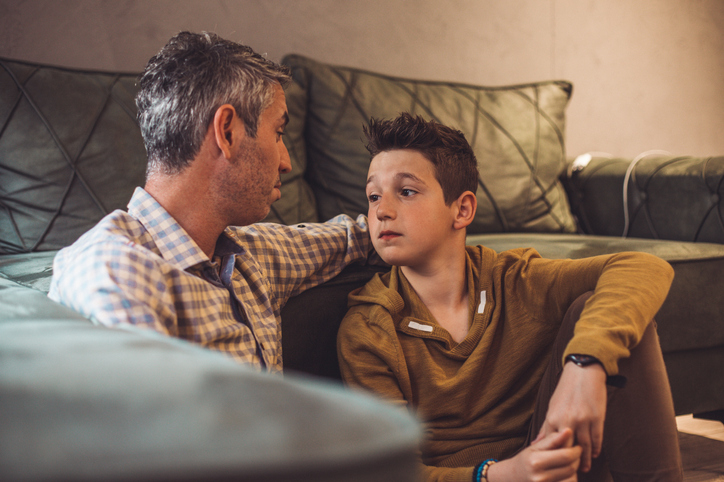If you have an adopted child, you may have heard some of the following phrases from them:
- “I wish you looked like me.”
- “I hate being different.”
- “I wish I knew my birth mom.”
- “I wish I wasn’t adopted.”
As an adoptive parent, you may have initially felt confused — and even hurt — by these phrases.
Remember: It’s not about you. You need to understand that your adopted child is vocalizing their experiences, not intentionally trying to hurt you. Only then can you express true empathy and help them feel heard.
What is Empathy?
Empathy is one of the most important qualities you can have when you’re a parent to an adopted child. Empathy is choosing to feel with someone, it is choosing to be vulnerable, and it is choosing connection.
As clinical researcher Dr. Brene Brown says: “Empathy is communicating that incredibly healing message of ‘You are not alone.’”
Empathy does not require you to have the same or similar experience as your child; it requires you to connect, listen and feel. Empathy is not about fixing the problem or having the right response; it is about being able to walk closely with them as they navigate their adoption and learn to own their story.
How Will Empathy Impact My Adoptive Parenting?
Embodying empathy as an adoptive parent will allow you to cultivate a healthy connection with your child — while also creating a safe place for them to share, process and grow.
But, if you can never truly understand your child’s experience as an adopted person, why is empathy important? Won’t it come off condescending or patronizing?
You may be surprised at the ways empathy can significantly impact your relationship with your adopted child:
1. Empathy will allow you to affirm your child.
Your adopted child needs affirmation that what they feel is real and valid, whether or not it makes sense to you. If your adoptee is struggling with belonging and connection, they need to know that you understand what they are feeling and believe it.
It can be incredibly hard for your child to process and articulate what they are feeling. But if they know you believe their feelings are valid and real, that will change everything.
Understand that your adoptee may say things that feel hurtful to you as a parent as they express and articulate their story. This does not change their need for affirmation; you should still confirm the hard things, just as you do the joyful aspects of their adoption.
Learning appropriate empathic responses will allow you to do so without seeming patronizing or condescending. Some good examples: “That must be really hard. Thank you sharing that with me.”
2. Empathy will guide you into the hard conversations.
Adoption can be really messy. There’s no closure or a way to completely work through it. It can be incredibly challenging for adoptees to navigate sharing hard truths with or asking hard questions to their parents.
Your adopted child needs to believe that you can hold hard conversations; otherwise they won’t share those difficult aspects of their adoption with you. When you’re an adoptive parent, it is important that your child feels support and heard when they start to share hard things. Being ready for conversations about adoption with your child is crucial. If you don’t feel ready, there are many resources for adoptive parents such as books, blogs, and even other parents that are walking through this same process.
It is also important to avoid phrases such as, “We can talk about this when you are older,” or “You wouldn’t understand at this age.” These inhibiting phrases could lead to your child not feeling safe opening up and sharing hard things with you.
If you show your child you are open to having hard conversations from the beginning, your child will be more likely to continue to share more difficult aspects of their adoption with you.
Your adoptee has things they want to share with you. The question is: Do you make them feel safe sharing it?
3. Empathy will provide avenues for deep connection and trust.
As mentioned earlier, empathy drives connection — and empathetic responses fuel trust. Your adopted child needs to trust that you are a safe person. If your child trusts you, they will share with you.
Trust is essential to any parent/child relationship regardless of whether or not adoption is present. Building trust early on is essential, as it will allow your child to feel safe sharing as they grow up. Your child will benefit from this relationship because they are able to share all hard things, not just those related to their adoption.
Your child needs the ability to share their story with someone. If your child does not want to share or process with you, find them a safe person. A safe person could be another adoptee, a counselor or therapist who is competent in adoption and trauma-based therapy, or even a family member they are close with.
4. Empathy will allow you to sit with your child while they try to navigate their story.
All adoption stories come with their layers of trauma and loss. Many adoptees can feel isolated and alone even if they have a healthy, supportive family and community. The best thing you can do as a parent is listen to these concerns and provide the kind of support they ask for.
But remember: Adoptees don’t need you to come in and fix the inherent brokenness and loss connected to their story. They need you to just be there.
It may take months or years for them to navigate and heal but you, as a parent, play a vital role in this process. There is no timeline for healing; what your child needs is for you to be there to listen.
There are many ways you can assist your child in this healing process, such as connecting them with other adoptees and cultivating more diverse community connections, especially for transracial adoptees.
Again, your role as a parent is not to fix your child — but you need to be prepared and ready to walk with them as they navigate the challenges and trauma connected with their story. Although you may never understand your child’s adoption experience, empathy provides a way for you to still deeply connect with him or her.
 Ramya Gruneisen is an adoptee who lives in St. Louis, Mo. She has an educational background in exercise science and public health and works as an adjunct professor at Lindenwood University in the Health Sciences Department. One of her greatest passions is teaching and sharing her love for health and wellness with others. As a transracial adoptee, she has a profound interest and passion for adoption research and education. She believes some of the best learning is done through story. She loves spending time with friends and family, climbing mountains and watching the St. Louis Cardinals and Blues play.
Ramya Gruneisen is an adoptee who lives in St. Louis, Mo. She has an educational background in exercise science and public health and works as an adjunct professor at Lindenwood University in the Health Sciences Department. One of her greatest passions is teaching and sharing her love for health and wellness with others. As a transracial adoptee, she has a profound interest and passion for adoption research and education. She believes some of the best learning is done through story. She loves spending time with friends and family, climbing mountains and watching the St. Louis Cardinals and Blues play.



